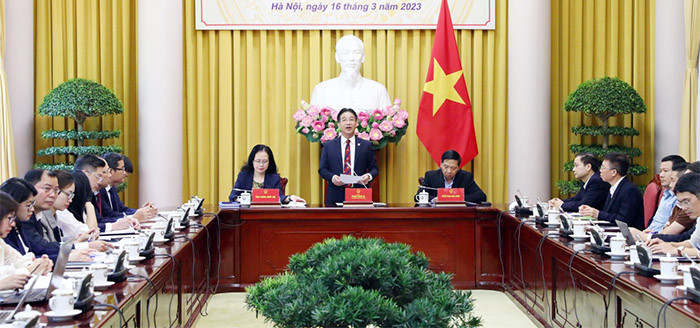The Ordinance stipulates that the maximum fine for each administrative violation in the field of state auditing by an individual is 50 million VND, while the violating organization is subject to a fine of 100 million VND.

The Office of the President held a press conference to announce the President's order.
On the afternoon of March 16, the Office of the President held a press conference to announce the President's order on the Ordinance on handling administrative violations in the field of state audit, which was approved by the Standing Committee of the 15th National Assembly, 20th session on February 28, 2023. The Ordinance takes effect from May 1, 2023.
The Ordinance approved consists of 5 chapters and 21 articles. Accordingly, the Ordinance stipulates that subjects subject to administrative sanctions are those who violate the provisions on obligations, responsibilities, and prohibitions of the State Audit Law.
Violations are determined based on the provisions of the State Audit Law and legal documents related to State Audit activities, including: Violations of regulations on prohibited acts; violations of regulations on obligations and responsibilities of audited units; violations of regulations on responsibilities of agencies, organizations and individuals related to audit activities as prescribed in Article 68 of the State Audit Law.
Regarding the form of punishment, for each violation, individuals and organizations must be subject to the following forms: warning or fine. The Ordinance also stipulates two remedial measures: forcing correction of information, documents, and data with false, inaccurate or dishonest content; forcing the return of illegal profits (if any).
At the same time, the Ordinance stipulates that the maximum fine for each administrative violation in the field of State Audit by an individual is 50 million VND, while the violating organization is subject to a fine of 100 million VND.

Mr. Dang The Vinh, Deputy State Auditor General, informed about the ordinance
At the press conference, answering a reporter's question regarding whether or not it is necessary to publish false information in the press, Mr. Dang Van Hai, Deputy Director of the Legal Department of the State Audit, said that when the State Audit comes to audit and discovers violations such as failure to implement audit decisions and conclusions, they will be handled according to the correct order and procedures of auditing.
“First of all, a record of the violation must be drawn up, which is the basis for the penalty. Then, based on the nature and extent of the violation, it will be quantified to see which clause the penalty is under, and based on the nature and extent of the violation, it will be determined whether the authority belongs to the head of the delegation or the chief auditor to impose the penalty. Not all acts must be made public, however, this is not a secret act; I do not know if there is any provision in the Press Law that requires this to be made public, so it needs to be considered further,” said Mr. Dang Van Hai.
Regarding the regulation on cases where cadres, civil servants, public employees, people in the People's Army, People's Police and people working in key positions commit administrative violations in the field of auditing while performing official duties and are not subject to penalties according to the provisions of the law on handling administrative violations, Mr. Dang Van Hai said that there must be conditions.
Administrative violations committed while performing official duties and such violations are part of the official duties and tasks of the agency will not be subject to administrative sanctions but will be subject to sanctions under other laws, as prescribed by the Government. The Ordinance on administrative sanctions in the field of State Audit must also comply with this, because laws, ordinances and Government decrees are unified.
According to VOV